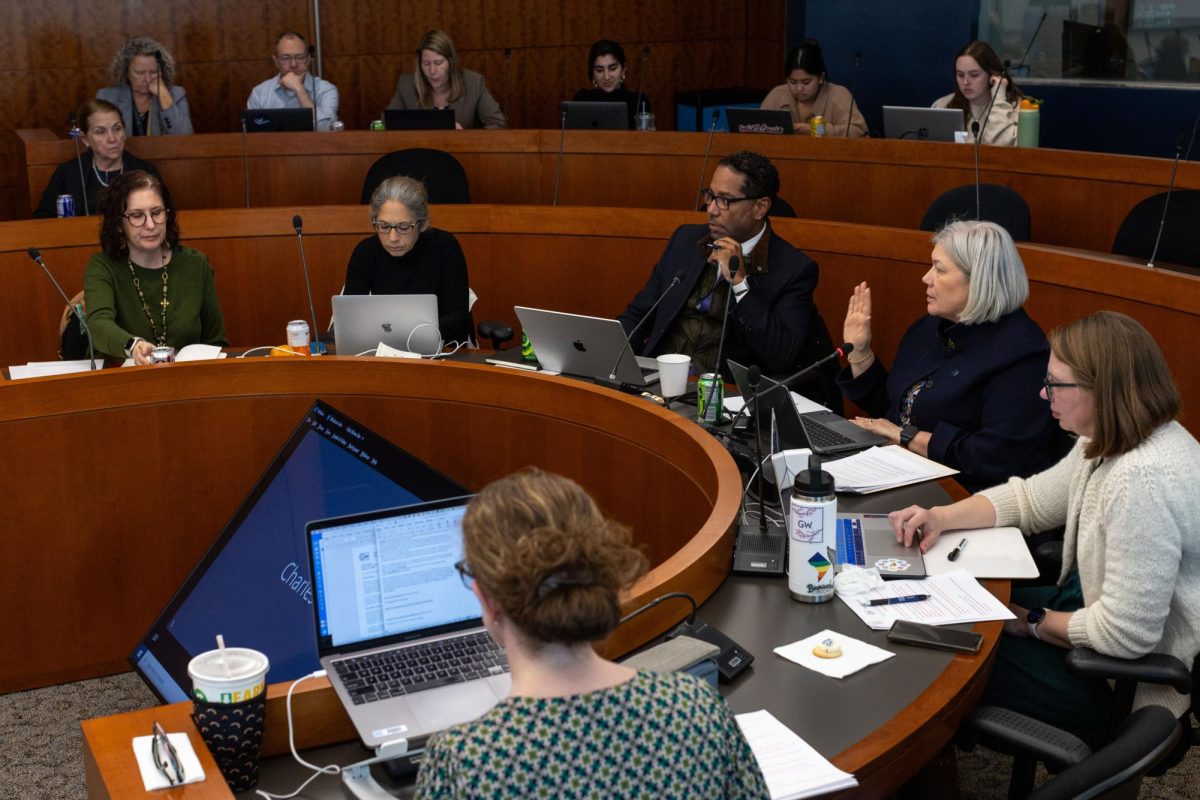Provost Brian Blake is considering a change to hike the minimum GPA students must keep to continue receiving merit aid, which experts say would align GW more closely with other schools.
Blake said at a Faculty Senate meeting this month that he is weighing the change to merit-based scholarships to ensure funding spent on merit aid is used effectively. Higher education experts said increases in minimum GPA are more likely to push students to perform better than to force them off scholarships, adding that administrators should offer students who fall below the higher GPA cut-off a grace period before withdrawing their merit aid.
Blake said at the senate meeting that he plans to speak to the deans of GW’s 10 schools in the coming weeks to discuss raising the minimum GPA from 2.0 to around a 2.7 average. He said the shift would not affect current students with merit scholarships, who will be grandfathered into the policy.
“From a quality perspective, and I’ve had this conversation with the deans, I think we have to draw a line that’s a little bit more scrupulous,” Blake said at the senate meeting.
He said in an interview that faculty have approached him after he floated the policy at the meeting asking whether the minimum GPA cut-off could vary by school to avoid punishing students enrolled in harder programs.
Undergraduates are eligible to receive nine merit scholarships, including the Presidential Academic and the Clark Engineering scholarships, all of which require recipients to maintain a minimum GPA of 2.0, according to the financial aid website. Students are considered for these scholarships when they apply to the University as a first-year student, the website states.
At least nine of GW’s 12 peer schools have a GPA requirement higher than 2.0 for most of their academic scholarships, most of which fall at a 3.0 average. Requirements among GW’s peer schools range from 2.0 to a 3.5 average, which New York University requires from its students for some scholarships.
Financial aid and higher education experts said the changes could raise the overall academic profile of the University as long as faculty and academic advisers offer support to students to help them succeed.
Val Meyers, the associate director of financial aid at Michigan State University, said the minimum GPA requirement for merit scholarships at her university ranges from 2.5 to 3.0, depending on the size of the award. She said raising the minimum requirement could provide more motivation to students to work harder and achieve higher marks.
“Often, it is a good wake up call to students who may not understand the rigor of college and thus aren’t putting in the effort needed to keep their grades up,” Meyers said in an email.
Meyers said the most common GPA requirements she has seen are 2.0, 2.5 or 3.0. She said GW’s 2.0 requirement is “the lowest possible acceptable GPA, but many scholarships use that as well.”
She said officials should ensure that students have resources available to them, like tutoring and writing services, to help students avoid falling behind the higher cut-off. She added that Michigan State officials often seek not to rush to penalize a student if they perform poorly in a single semester as long as the performance does not become a trend.
“We will at times give students a probation term before canceling the award, so one bad semester doesn’t mean that they lose the award,” Meyers said. “But a second term below the required GPA generally means the award is canceled.”
Natasha Jankowski – a research associate professor of education policy, organization and leadership at the University of Illinois at Urbana-Champaign – said the GPA minimum for merit scholarships at her university is school-specific, taking into account the difficulty of each program, and ranges from 2.0 to 3.0.
“It’s really dependent on the type of institution, how selective it is and then also the merit scholarship, if it’s for a specific degree program, areas of studies,” Jankowski said.
Jankowski said officials should clearly communicate about raising the GPA and consult students who may be impacted before making a decision. She said she recommends that the provost speak to academic advisers, who she said are most attuned to students’ concerns, before making a decision.
Blake said in an interview that he wants to ensure students applying to GW are aware of any new policy changes before accepting their admissions offers.
“I think wide conversation, multiple stakeholders, specifically having a meeting – that’s fantastic,” Jankowski said. “But talk to some students, talk to admissions, talk to financial aid and talk to advising for sure.”
Teboho Moja, a clinical professor of higher education at NYU, said GW’s current 2.0 GPA requirement is low because a 2.0 means students hypothetically performing in the 50th percentile – better than half of the population but worse than the other half – are able to keep merit aid.
Moja said a 2.0 average may be acceptable for need-based scholarships but should not be standard for merit-based ones.
“If we are to link the GPA to subject and content knowledge, it means we are saying that it is OK to know 50 percent of the work and you can be awarded a scholarship,” Moja said.











